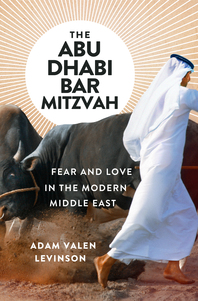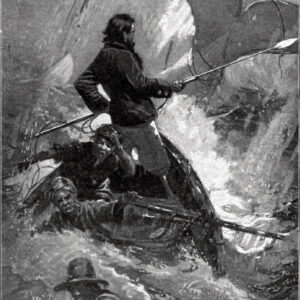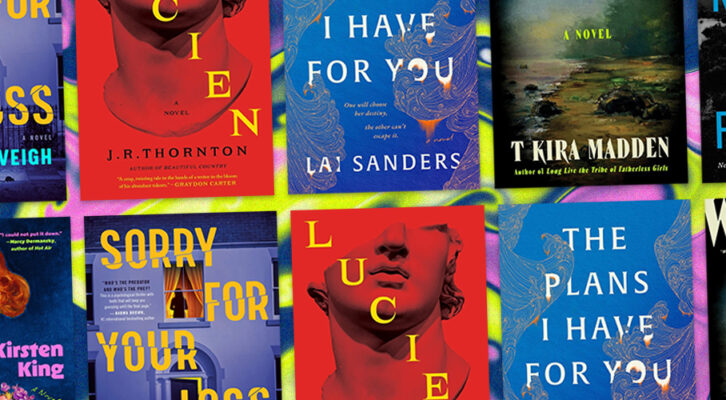
The Fine Art of Learning to Say Nothing in Arabic
Adam Valen Levinson Falls in Love in a Foreign Language
An Apology from the Editors: The following excerpt from Adam Valen Levinson’s memoir should never have made it through our editorial process. Though the memoir in question recounts the writer’s dawning understanding of the orientalist gaze, and how corrosive it can be, in excerpting the beginning of the text without context, we let down our readers, who deserve better. The exoticizing language in any piece like this, the casual Othering, is not only a failure of literary empathy and observation, but it reinforces a toxic framework within which racism flourishes and power retrenches.
As we have said before, there can be no meaningful separation of the literary and the political, and the decisions we make at this website go much deeper than buzzed-about novels and tips for finishing your book. We live in a precarious era of untruth and weaponized language, in which life and death is often a matter of the syntactical “us” and “them”—so it is fundamental to our job as editors to be vigilant about the power of words to harm and dehumanize, and in this case, we failed. For that, we apologize.
As ever, we are committed to publishing writing that elevates rather than diminishes. In the coming weeks (as we have done in the past), we will continue to foreground Arab and Arab-American voices—alongside a wide array of perspectives—with the firm belief that the literary community is only as strong and vital as it is broad and inclusive.
–Jonny Diamond and Emily Firetog, Literary Hub
We were mostly Americans on the flight out of Chicago, crossing Greenland and Sweden, passing over Lithuania and Turkey, then Iran. No one had taken advantage of Etihad Airlines’ falcon policy, by which a bird of prey is permitted at merely three times the cost of an extra checked bag. Two more are welcome if you buy them a seat. With no such distractions, I watched the Chinese game show Just Go, and felt the world grow small: it was just as terrible as American TV, and just as glorious.
“Juice?” said the pretty attendant in a pretty hat, balancing three glasses on a tray, two of them shades of orange.
“What’s the orange one?” I asked.
“It’s orange,” she said.
Clearly, I didn’t belong. Obviously, one of the oranges was orange—or had even that been too hasty an assumption? I took the glass of the mystery orange, and a tentative nip. It was fitting, in a way: the root of the Arabic for carrot, jazar, is shared by the words for island and peninsula, as in “the Arabian Peninsula,” or “the island of Abu Dhabi.” Of course, it was total coincidence in that place where linguistic bloodlines run tangled back into ancient history, but as we headed toward Jazirat al-‘Arab, I couldn’t help but imagine our destination like a great carrot on the map.
I had never been much for going with the flow, but a certain flow had brought me here. I left high school dreaming of Russian study, and Hebrew, and Modern Greek—languages I connected to through ancestors once or twice removed, and thought sounded sexy. But in the last four years, I had hardly questioned why I spent my first week of college auditing two Arabic classes in the hope of winning a spot. Consciously, in my only moment of choice, I just thought it would be fun.
My cousins in Jerusalem thought I was mental. When I talked to Itai in his camp in the Negev at officer’s school in the Israeli army, where he trained boys younger than we were to train boys younger than they were, I could hear him shaking his head over the wire. “I just don’t get it. Why don’t you learn Hebrew?”
“Because you speak English,” I said.
In a windowless belowground classroom uptown, my elementary Arabic class met four times per week for 75 minutes.
Seven miles from the deadliest attack ever on American soil, the study of this language—the official tongue of the religion claimed by these attackers—carried a special emotional charge. There were native speakers of Arabic dialects unversed in the literary language, political scientists, Hebrew-speaking Jews, and total neophytes like me, and no one denied the impression that this was a language that represented a certain opposition—that it was on the other side of something. Many of us were drawn in because we were nosy, and we looked for bridges across the murky gap.
Downtown five years earlier, 9/11 had forced Arab and Muslim and Middle Eastern on to the airwaves—it was wartime with rhetoric to match, and the battle lines of our new enemies were painted with huge, clumsy brushstrokes. The attack had made us all forcefully selfconscious. We perceived them, assumed their perceptions of us, and then canceled all the flights to Beirut. But by learning the primary language of this region, some of us thought, we might be able to figure out what them were really thinking. Learning to spell salaam alaykum seemed like a good place to start.
I was hooked long before I felt the language let fall the first of its veils, revealing morphology as finely calibrated as the engine of a race car: from the words to know (‘alama) we can divine, through patterns; to teach (to make know—‘allama); to learn (to make oneself know—ta‘alama); to inquire (to seek to know—ista‘alama); scholar (a knower—‘aalim); and information (the knowns—ma‘alumaat)! And in the reverse, the unknown is knowable if we can recognize the root. A little familiarity can go a long way.
Of course, we often guess wrong. That word for scholar—‘aalim— usually means “world.”
“To live in Arabic is to live in a labyrinth of false turns and double meanings,” Jonathan Raban wrote in Arabia Through the Looking Glass. “No sentence means quite what it says. Every word is potentially a talisman, conjuring the ghosts of the entire family of words from which it comes.” Its trademark haziness can only be cleared, as far as it will ever be cleared, by knowing as many members of that family as possible.
And yet, the language unfolds even through the missteps, and as we skitter along the web of rules and quirks, the ghosts of Raban’s Arabic come quickly out into the daylight.
But there are other traps. In school, from a Moroccan teacher or a Tunisian or a Syrian, we learned Modern Standard Arabic. Known as Fusha, from a root that means “to be eloquent,” MSA is the official language of two dozen countries and is spoken nowhere. Formal Arabic is the native tongue only of television (but only the news) and print. Everywhere else, regional dialect takes over, complete with homegrown rules of conjugation, syntax, vocabulary, and pronunciation.
As a saving grace, MSA is understood far more widely than it is used. Schoolchildren learn the formalities of case endings and the sounds of the official language, but it’s like putting scaffolding on a building that’s already finished. When you begin to speak with a newscaster’s diction, they’ll get it—the news sounds like you, after all—but with every word you say, you’ll say more than you mean—and less.
Studying in our underground vacuum we practiced a kind of childlike curiosity, abstract and theoretical and not yet made to answer to the strictures of real life. Soon, it would be. Arab friends tittered when I said something in Fusha outside the classroom. Say it again!
To them, it sounds like you’re speaking in Elizabethan English, my Moroccan professor told us. Then, he continued to teach us how to sound like Shakespeare.
*
After graduation, I took the Language Pledge in the spirit of curiosity at a summer program in Oakland. For ten weeks before I left for Abu Dhabi, I promised to speak only in Arabic. Just before I was to leave the continent unfettered, I met a girl there who would tether a part of me to it, and we were nearly dating before we ever said words in English.
It was astonishingly easy to feel close when we accepted that we wouldn’t dig for meaning in the minutiae of word choice and turns of phrase, as we would have on first dates in English. Masha and I were in just the right place to simply feel at each other.
Says Raban, Arabic “is perfectly constructed for saying nothing with enormous eloquence; a language of pure manners in which there are hardly any literal meanings at all and in which symbolic gesture is everything.” Just as the words that follow sneezes in languages around the world are loosened from their literal meaning—the French to your wishes! the Pashto patience!—Arabic back and forths often serve the connection far more than the dictionary. Something is said and heard, and meaning is made from the interaction.
There is a single word (na‘iman!) to greet the freshly shaved or recently showered; there is a common answer to any request (‘ala ra’si—“on my head”). Words become gestures and the roots are forgotten. Na‘iman comes from one of the many words for paradise, but it’s silly to think paradise is invoked every time a friend trims his mustache.
With only literature and textbook grammar to go on, though, we made our own symbolic gestures out of direct translations of American slang. The trouble: word-for-word renderings of “What’s up? What’s cracking? Yo dawg!” sound like total nonsense. And if we were really thinking in Arabic, calling each other “dogs”—unloved and thought unclean across the Arab worlds—should have been deeply offensive.
The silliness was a welcome distraction from the truth: that we were getting no closer to learning how to say nothing, how to be eloquent in real live Arabic. We still said too much with every word. We shouted “What is above, my dog?” across the courtyard and thought it was hilarious. It felt like we had skipped many of the wordy steps in the construction of American romances. Weeks later as I boarded the plane to the Gulf, she was signing her e-mails with love.
Carrot juice became cocktails, caviars and steak in my massage recliner between Coral and Diamond classes.
And then, by the light of a red sunset above the clouds, I caught my first glimpse of the Gulf. And we descended and the triangle of Abu Dhabi stuck out into the water like a slice of baklava. And dark came all of a sudden, eased by the moon not two hours from full, and the plane landed by the lights of the city.
__________________________________
From The Abu Dhabi Bar Mitzvah, by Adam Valen Levinson, courtesy W.W. Norton. Copyright 2017 Adam Valen Levinson.
Adam Valen Levinson
Adam Valen Levinson is a journalist and travel writer whose work focuses on human stories in conflict areas. His work has appeared in numerous outlets, including VICE, the Paris Review, Al Jazeera, and Haaretz. He is an affiliate of the Middle East Institute in Washington, D.C., and a fellow at the Center for Cultural Sociology at Yale University, studying humor as a key to cultural understanding.




















